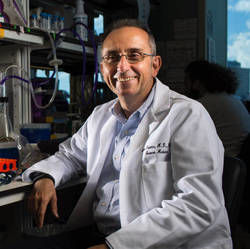Call Now Open
2026 Oxford-Harrington Rare Disease Scholar Award

Oncology
Preclinical Development and Clinical Positioning of an Inhibitor of PRMT1 in Pancreatic Cancer
2017 Harrington Scholar-Innovator
Dr. Draetta's team has identified the enzyme arginine methyl transferase PRMT1 as a critical regulator of growth in pancreatic cancer, a disease recalcitrant to treatment due to the presence of KRAS and p53/ SMAD4 mutations. They have generated potent and specific inhibitors of this enzyme and are assessing their mechanism of action and efficacy in disease models. With the support of the Harrington Discovery Institute's Innovation Support Center, the team aims to identify a suitable drug candidate to move forward into clinical development and to dissect the underlying biological mechanisms that drive response to PRMT1 inhibition. Dr. Draetta and his team are planning to submit an Investigational New Drug Application to the United States Food and Drug Administration within two years.
“I have devoted my career to cancer genetics and translational medicine. Even with the incredible scientific advancements of recent years, our ability to provide patients with cancer therapies that can dramatically impact the course of their disease remains inadequate.
The gap in time between scientific discovery and viable therapeutic modality is unacceptably long, and often spans decades. With the Harrington Discovery Institute's help, we hope to shorten that cycle dramatically.” “We use a state-of-the-art in vivo platform to interrogate the functional cancer genome toward identifying druggable vulnerabilities within very specific disease contexts. With this approach, we not only uncover novel cancer dependencies, but we are poised to deeply understand the biological reasons why a tumor depends on a particular gene product. This project was born from this platform upon our discovery that PRMT1 inhibition dramatically blocked the growth of human-derived pancreatic adenocarcinoma models, and we are making important progress towards understanding why that is the case.”
“Our model of academic drug discovery requires active fundraising. We wish to keep our programs at least initially independent of the biotech and pharmaceutical industry – relying on the world-class scientific resources of the M.D. Anderson Cancer Center and their top-notch faculty and clinicians – to maintain our focus on clinical need and biological relevance.”
“This is our mission, to ensure that the drugs we deliver to our patients have the highest possible impact on disease.”
Source: Article from 2017-18 Annual Publication.